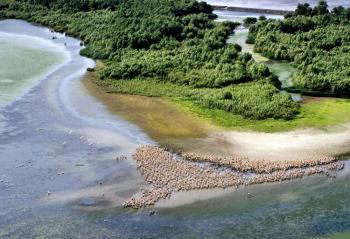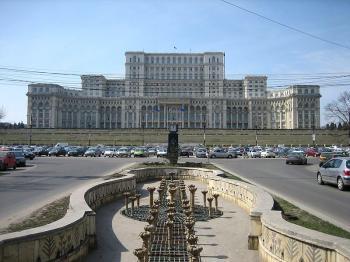After months of uncertainty, the names of most of the crew members of the Italian ship Buccaneer, seized by Somali pirates, have been released.
The online Italian publication Liberoreporter.it revealed on Monday, July 6, the names of four of five Romanian sailors taken hostage, along with 10 other fellow Italians and one Croatian by Somali pirates in the Gulf of Aden on April 11.
According to the source, all four Romanian sailors whose names were published—Nicusor M. (chief engineer), Adrian G. (deck officer), George D. (mechanic), Marius A. (pilot)—were from the Romanian city of Constanta, while the fifth sailor was from Bucharest. All five Romanian sailors are between 28 and 35 years old.
There are over 40,000 Romanian sailors boarded on various ships around the world. This stems from the maritime tradition of Romania, which in the past owned a third of the world’s merchant fleet. In light of the economic crisis and the fact that Romania has only five commercial vessels left, Romanian sailors take out contracts on foreign ships passing through the Gulf Aden and the Horn of Africa, where Somali pirates have operated for several years.
“After the Filipino sailor community, with over 100 sailors in the hands of pirates, and Ukrainians, with 20 sailors seized in the Gulf of Aden, in the third place in the ranks of those nations most affected by the phenomenon of piracy comes Romania, with 16 sailors taken hostage,” reports Liberoreporter.it.
The Italian site has frequently published articles in recent weeks about the Buccaneer, and talks about the drama that the 16 families of the kidnapped sailors are going through, as the Italian Foreign Ministry chose to deal with the problem in a quiet way.
Italian press has recently published several articles about the crew of the Buccaneer, including telephone discussions with Somali kidnappers who pressed for negotiations with the Italian authorities to be performed directly, without intermediaries.
In an article published recently by the daily newspaper La Stampa, the father of a kidnapped Italian sailor stated that all five Romanian sailors had been transferred to shore to fishing villages by their kidnappers, while the ship remains anchored off the coast of Lasqorey village, 68 miles west of the port of Bosasso, the economic capital of the Somali region of Puntland.
Ship captain Mario Iarloi said on June 10 that six of the crew members had been transferred to shore. Pasquale Vollaro, the father of one of the Italian sailors, said only the 10 Italian sailors are still on board and are being treated very badly by their kidnappers.
“The pirates moved the Romanian sailors to shore and kept on board the ten Italians, whom they treat like animals. My son told me they only get a little rice every day, they have no drinking water and they have to boil the water they get because it is dirty. He is afraid they will be killed, he is terrorized,” Vollaro said.
Early June, ship captain Mario Iarloi contacted the newsroom of Corriere della Sera and told reporters that the crew has very limited reserves of food, drinkable water, and medicine and people are forced to live without air conditioning in temperatures that frequently top 104 F.
“We are exhausted. Please rescue us from this ordeal, or we’ll ask the pirates to kill us,” the ship’s captain said over the phone.
The Italian Foreign Ministry has repeatedly stated that negotiations for the release of the crew are conducted through political channels, via Somalia, not directly with the pirates. Additionally, he stated that the possibility of military action to force the release of the crew or getting the crew released through payment of a ransom has been excluded.
He has asked the Italian and Romania press to be more discrete in this case, not to endanger the sailors’ lives by circulating information about them.
The ship Buccaneer is the first Italian flag sequestered by Somali pirates, and the press speculated in April, during the first days after the seizure, that Rome would obtain a quick release of the crew due to their influence in the former Italian colony. These comments were fueled at that time due to the optimism shown by some senior Italian officials such as Premier Silvio Berlusconi, the President of the Chamber of Deputies Gianfranco Fini, and the head of diplomacy Franco Frattini.
The online Italian publication Liberoreporter.it revealed on Monday, July 6, the names of four of five Romanian sailors taken hostage, along with 10 other fellow Italians and one Croatian by Somali pirates in the Gulf of Aden on April 11.
According to the source, all four Romanian sailors whose names were published—Nicusor M. (chief engineer), Adrian G. (deck officer), George D. (mechanic), Marius A. (pilot)—were from the Romanian city of Constanta, while the fifth sailor was from Bucharest. All five Romanian sailors are between 28 and 35 years old.
There are over 40,000 Romanian sailors boarded on various ships around the world. This stems from the maritime tradition of Romania, which in the past owned a third of the world’s merchant fleet. In light of the economic crisis and the fact that Romania has only five commercial vessels left, Romanian sailors take out contracts on foreign ships passing through the Gulf Aden and the Horn of Africa, where Somali pirates have operated for several years.
“After the Filipino sailor community, with over 100 sailors in the hands of pirates, and Ukrainians, with 20 sailors seized in the Gulf of Aden, in the third place in the ranks of those nations most affected by the phenomenon of piracy comes Romania, with 16 sailors taken hostage,” reports Liberoreporter.it.
The Italian site has frequently published articles in recent weeks about the Buccaneer, and talks about the drama that the 16 families of the kidnapped sailors are going through, as the Italian Foreign Ministry chose to deal with the problem in a quiet way.
Italian press has recently published several articles about the crew of the Buccaneer, including telephone discussions with Somali kidnappers who pressed for negotiations with the Italian authorities to be performed directly, without intermediaries.
In an article published recently by the daily newspaper La Stampa, the father of a kidnapped Italian sailor stated that all five Romanian sailors had been transferred to shore to fishing villages by their kidnappers, while the ship remains anchored off the coast of Lasqorey village, 68 miles west of the port of Bosasso, the economic capital of the Somali region of Puntland.
Ship captain Mario Iarloi said on June 10 that six of the crew members had been transferred to shore. Pasquale Vollaro, the father of one of the Italian sailors, said only the 10 Italian sailors are still on board and are being treated very badly by their kidnappers.
“The pirates moved the Romanian sailors to shore and kept on board the ten Italians, whom they treat like animals. My son told me they only get a little rice every day, they have no drinking water and they have to boil the water they get because it is dirty. He is afraid they will be killed, he is terrorized,” Vollaro said.
Early June, ship captain Mario Iarloi contacted the newsroom of Corriere della Sera and told reporters that the crew has very limited reserves of food, drinkable water, and medicine and people are forced to live without air conditioning in temperatures that frequently top 104 F.
“We are exhausted. Please rescue us from this ordeal, or we’ll ask the pirates to kill us,” the ship’s captain said over the phone.
The Italian Foreign Ministry has repeatedly stated that negotiations for the release of the crew are conducted through political channels, via Somalia, not directly with the pirates. Additionally, he stated that the possibility of military action to force the release of the crew or getting the crew released through payment of a ransom has been excluded.
He has asked the Italian and Romania press to be more discrete in this case, not to endanger the sailors’ lives by circulating information about them.
The ship Buccaneer is the first Italian flag sequestered by Somali pirates, and the press speculated in April, during the first days after the seizure, that Rome would obtain a quick release of the crew due to their influence in the former Italian colony. These comments were fueled at that time due to the optimism shown by some senior Italian officials such as Premier Silvio Berlusconi, the President of the Chamber of Deputies Gianfranco Fini, and the head of diplomacy Franco Frattini.



